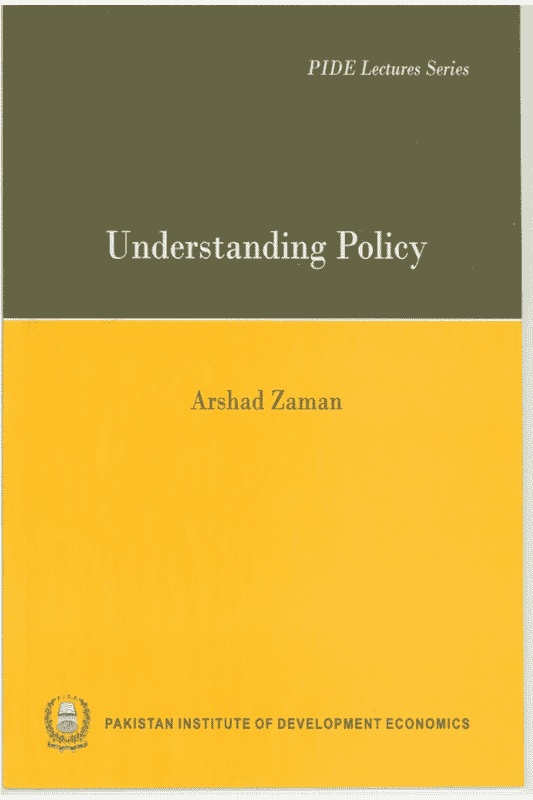Understanding Policy
INTRODUCTION
It is at once a privilege as well as a daunting task to speak to this distinguished audience of academics, advisors, officials, and other guests who have extensive experience in the analysis, formulation, and implementation of policy, not just in Pakistan but in numerous countries abroad. I am also honoured that my host is the distinguished Vice -Chancellor of the Pakistan Institute of Development Economics, a prolific scholar and a practitioner who has written extensively on economics, on policy, and on Pakistan. It is also a pleasure to be among old friends and former colleagues who have taught me so much and from whom I hope again to learn today.
I have been asked to speak on policy. Let me start by reminding ourselves that when we speak of policy, in most cases we are talking about government policy. This raises the question: does the nature of government matter to an understanding of policy? In particular, can we assume that the policy of governments that ‘rule by the sword’ can be understood in much the same way as the policy of governments that consider themselves to be accountable to those whom they govern, under law? This is especially relevant since policy is implemented through law and regulation, and where governments are not accountable, under law, the significance of government policy is quite different from where they are.
As you can anticipate, I hope to argue that the social and political context of governance is critical to the way we understand policy. In doing so I shall attempt first, to define some of the key words that I shall use: policy, government policy, public policy, government, governance, and the state. Second, since most of our ideas about policy come from Western societies I shall sketch briefly the three patterns in the evolution of the state in Western countries, and how this affects the way policy is viewed mainly in England and America. Third, I shall outline briefly the evolution and nature of what I will call the ‘colonial’ state in Pakistan. With this rather long introduction, I shall comment on economic policy in Pakistan, in the context of the state versus market debate in policy, and say a few words on why there is no social policy to speak of in Pakistan and the alarming consequences of this conclusion. Finally, I shall conclude by making a few observations on what the pursuit of this colonial policy has meant for Pakistan and what it may hold for the future.
1. MEANING OF POLICY
The word policy can mean different things to different people. So let me start by defining how I intend to use the word today. By ‘policy’ I shall refer to a course of action adopted and pursued as advantageous or expedient by a government. Although I say government, by extension we may also speak of the policy of components of—or factions within—government, or of organs of government, or of organisations controlled by one or more governments. In most cases however policy refers to government policy (or, where the government claims to represent the will of the people, to public policy). There are three important consequences of this definition.
First, in the light of this definition, we can distinguish between actions by government, which when pursued with an underlying logic—and not simply as an ad hoc act, say of building a road or a port, or allocating expenditure to some budget item—constitute policy, proper, and statements about intended or about recommended actions, which can be called policy statements or policy advice, respectively. It can be argued, of course, and rightly so that the promulgation of a statement or the rendering of advice are also actions, but for the purposes of the present argument I have not thought it fit to make finer distinctions between say hard actions (like land reforms, nationalisation, privatisation, etc.) and soft actions (like the issue of a policy statement that the government is committed to alleviate poverty, etc.). It is important to keep in mind then that from this viewpoint, neither advice nor statement is policy, proper, and the policy of an advisor can often be the opposite of the advice she gives ; and the policy of the government, the opposite of the policy statement that they announce. We should also note that effective policy action is underpinned by legislative acts that create rights enforceable against the government and this is to be distinguished from discretionary actions that are an act of grace by the government.
Second, we need to distinguish policy advice or statement from other kinds of advice, statement, or propaganda that characterise the ‘white noise’ that the government and its interlocutors generate in and around the conduct of government. To qualify as a policy proposal or pronouncement, I suggest we look for four things: (1) the agent that would carry out the proposed action should be identified; (2) the action proposed should be within the capability of the proposed agent, and (3) that it should be compatible with the nature and interest of the proposed agent; and finally, that (4) the proposal be ‘instrumental’ in the sense that the instrument proposed to achieve the desired result should be independent of the target. Let me explain what these criteria entail and what they rule out.




